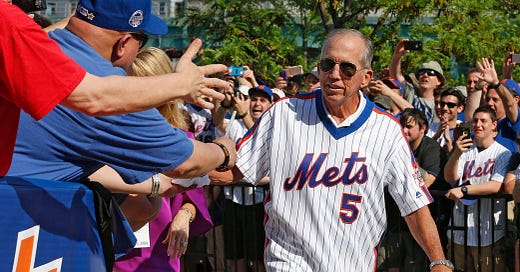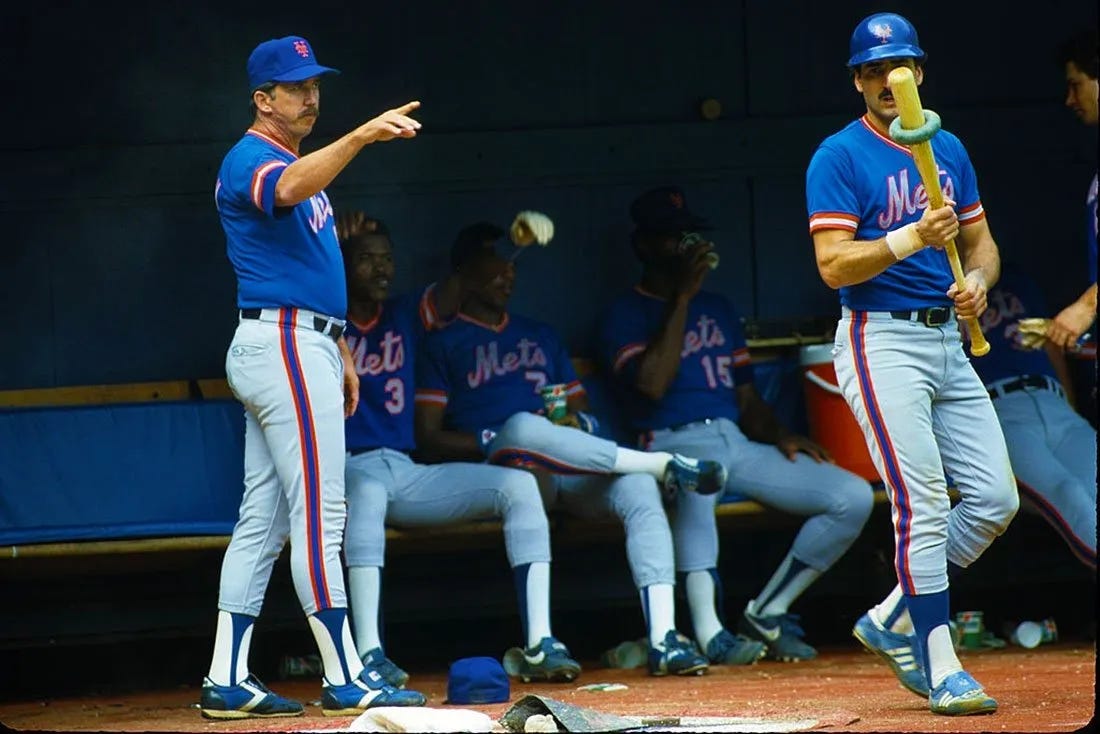Davey Johnson: A Beautiful Mind
For 6+ years Davey Johnson managed the New York Mets including five straight years of 90 or more wins and a World Series title.
I love talking to baseball managers, especially about in-game strategy. When I reflect on my years covering the game, I have realized how much wisdom I have gleaned from managers.
The first manager that always comes to mind is Davey Johnson, the winningest manager in New York Mets history.
Before Bill James and Billy Beane and Moneyball, Johnson was devouring the writings of Earnshaw Cook. The late metallurgist and author of the 1964 book Baseball Percentages believed playing the percentages was a fool’s errand.
Cook also theorized:
The sacrifice bunt is one of the least productive plays in baseball.
The best time to steal is with two outs.
A team should start the game using a reliever, followed by a starter who would pitch the bulk of the middle innings, and a “short man” would finish the game.
Johnson didn’t always agree with Cook’s theories, but he appreciated how the ideas challenged baseball’s stale archetype thinking about strategy and was an early adopter of sabermetrics.
Just a handful of credit hours short of a degree in mathematics and a wealth of baseball knowledge, Johnson merged the two passions to his benefit when he began his second career as a baseball manager.
As a player with the Orioles, Jim Palmer and Frank Robinson nicknamed Johnson “Dum-Dum” because he was always presenting theories about player usage, lineups and game strategy.
“That is when I knew he would manage,” said Palmer.
“He is as good as it gets. A renaissance man. He knows a lot of stuff. His biggest asset was knowing how to use his players — some every day, some sparingly.” — Ron Darling (1986)
Johnson was a firebrand; a man ahead of his time. His far out theories, not always compatible were beyond comprehension to his peers in the 60s. When he was in Baltimore, the future manager could be found spending his free time computing and printing statistical probabilities.
When he finally got the call from the Mets in 1984, Johnson was already a full-blown baseball stats nerd. In fact, shortly after Johnson was hired as manager, he hired Russ Richardson, a data processing manager.
Richardson’s first job: Collect all the offensive data on every player, how well they hit against every pitcher in every park, how Mets pitchers performed against every opponent, and when teams had a tendency to attempt a steal or hit-and-run.
“I was basically a systems analyst at that point,” said Johnson. “I was going to be baseball’s first big-league manager to embrace sabermetrics.”
It paid dividends pretty quickly.
Consider Johnson’s managerial record alone: 595 wins and a .588 winning percentage. Two seasons with 100+ wins, two division titles and, of course, the last manger to lead the team to a World Series title in 1986.
In his first year as a major league manager — 1984 — Johnson’s Mets won 90 games. If you lived and died with the Mets in the late 70s and early 80s, you know, 1984 was special. The a Mets finished 1983 in last place with a 68-94 recording, the team‘s sixth consecutive losing season. One year later, Johnson led a young talented core of players to 90 wins.
With Darryl Strawberry, Keith Hernandez, George Foster, Hubie Brooks, Jesse Orosco and Mookie Wilson, Bruce Berenyi and Walt Terrell already in place, Johnson added Dwight Gooden, Sid Fernandez, Calvin Schiraldi and let young, but inexperienced, talent like Wally Backman and Mike Fitzgerald play in a regular basis.
Johnson believed in his young players. He knew his players and they knew him. Most of them played for him in the Mets farm system and Johnson knew he had outstanding raw talent hungry to prove themselves.
“In ’84 I knew we had some good players but I also knew we were missing a bunch of good players,” Johnson said. “We got outscored by 18 runs and still won 90 games. If you were paying attention, you realized that was a great accomplishment.“
Even as a rookie major league manager, Johnson realized quickly he thought about the game differently than his peers, especially pitching.
“One of my hard-and-fast rules was to always put a young pitcher in the position to get a win,” Johnson explained in his book Davey Johnson: My Wild Ride in Baseball and Beyond. “I watched how other teams managed young talent and would often shake my head. I’d see a kid with a lead after six innings and marvel at how he’d be allowed to go out and pitch the seventh inning. Maybe he still had a friendly little pitch count, but I wouldn’t let a young pitcher get in a position where he could get the loss. I would see a guy who had a great curveball for six innings, but now he was leaving the ball up. That’s an indication of a tired arm, and I would quickly take him out of the game.”
Johnson knew the psychological impact that could have on a young pitcher, so he made every effort to set his young pitching staff up for success.
“If there was a time when I thought the kid was going to have a tough matchup and I could give him an extra day’s rest, I wouldn’t hesitate,” he said. “Building a young starting pitcher’s confidence was equally as important to me as taking care of his arm.”





